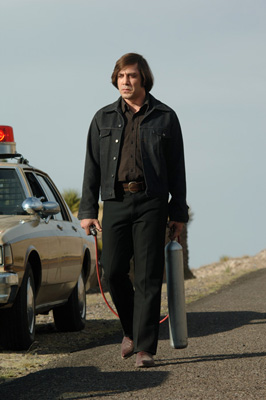If memory serves, this review provoked more hate mail than anything else I ever wrote for the Reader, very little of which engaged with my actual argument — a response I tend to correlate with this country’s unreasoning and irrepressible infatuation with and worship of serial killers as virtual religious icons (roughly akin to rock musicians who die of drug overdoses). But according to the Reader, it is also one of my most widely read Reader pieces. It ran in the November 8, 2007 issue, a little less than four months before I retired from the paper. — J.R.

No Country for Old Men | Written and Directed by Ethan and Joel Coen

The first thing we demand of a wall is that it shall stand up. If it stands up, it is a good wall, and the question of what purpose it serves is separable from that. And yet even the best wall in the world deserves to be pulled down if it surrounds a concentration camp. —George Orwell
I tend to get flustered when people ask me what I look for in movies, so I’m wary of theorizing too much about what other people want from them. Moviegoers generally seem to fall into one of two categories: those looking for experiences similar to ones they’ve already had and those looking for experiences that are new. Read more
Note: items followed by “(i)” have been reformatted and are also illustrated. (There are a few long reviews that appear on this site twice, once with illustrations and once without, although I’ve started to delete the non-illustrated duplications whenever I spot them.) For some strange reason, one of my long reviews, of both Star Wars: Episode I—The Phantom Menace and Trekkies, which appeared in the May 21, 1999 issue of the Chicago Reader under the title “Summer Camp,” didn’t make it onto either the Reader’s web site or my own until I recently copied it here. (I’ve also added another text missing from both sites, from the same year, on the four-hour Greed, which I already had in digital form because it was reprinted in my collection Essential Cinema.) Still missing from both sites is my brief ten best piece (actually, 20 best) for 2006, which appeared at some point in December 2006 or January 2007. If readers spot any errors here, I would welcome hearing about them, at jonathanrosenbaum at earthlink dot net.
***
Abigail’s Party, 1/10/92 (i)
The Abyss, 8/11/89 (i)
The Accidental Tourist, 1/13/89 (i)
The Accompanist, 1/28/94 (i)
Ace Ventura: Pet Detective, 3/4/94 (i)
The Actor, 4/11/97 (i)
An Actor’s Revenge, 6/3/88 (i)
The Adopted Son, 4/2/99 (i)
The Adventures of Baron Munchausen, 3/17/89 (i)
The Adventures of Sharkboy & Lavagirl in 3-D, 6/10/05 (i)
Aerograd, 6/7/02 (i)
The Affair of the Necklace, 12/21/01 (i)
After the Sunset, 11/18/04 (i)
Against the Day (novel), 12/1/06 (i)
The Age of Innocence, 9/17/93 (i)
A.I. Read more
Commissioned by Fandor Keyframe in late January 2016. — J.R.

Mark Rappaport and I have been friends for well over three decades. He’s a year older than me, and even though our class and regional backgrounds differ, we’re both film freaks and film historians who grew up with the same Hollywood iconographies, for better and for worse. How these experiences might qualify as better or worse have been the source of countless friendly arguments, all the more so when they converge on the same objects of fascination — as the title of his latest video puts it, Debra Paget, For Example.

Thirty-six minutes and thirty-six seconds long, this juicy video about the 15-year screen career of Debra Paget (1948-1963, ages 14 to 29, including a busy eight-year stretch as contract player at Fox, 1950-1957) seems at times to cover almost as much material and as much cultural ground as Rappaport’s two star-centered film features, Rock Hudson’s Home Movies (1992) and From the Journals of Jean Seberg (1995), both of which I’ve reviewed in the past. (See www.jonathanrosenbaum.net/1992/11/rock-criticism and www.jonathanrosenbaum.net/2022/12/riddles-of-a-sphinx for specifics.) It might even be called a compendium of Rappaport’s rhetorical strategies, such as using an actor to play the star in question — as in those two features, although here only offscreen (as was also done in his brilliant recent video I, Dalio, or The Rules of the Game), with Paget voiced by Caroline Simonds — and using Rappaport’s own voice, as in another recent video, The Circle Closes. Read more




